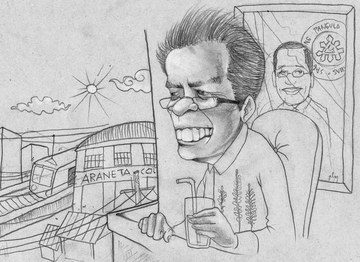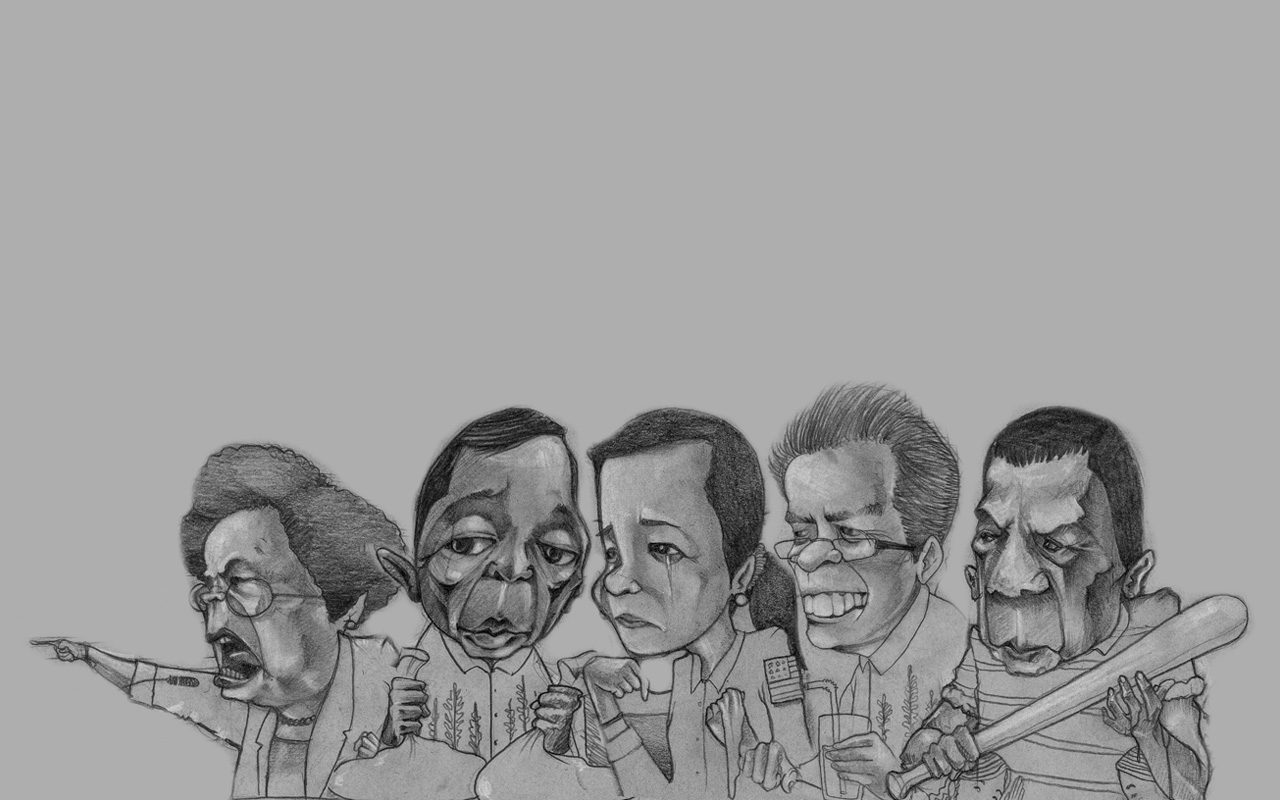SUMMARY
This is AI generated summarization, which may have errors. For context, always refer to the full article.

This compilation was migrated from our archives
Visit the archived version to read the full article.
Illustrations by Geloy Concepcion Design by ANALETTE ABESAMIS and DOMINIC TUAZON
Rappler’s series of
Here, in The Demonized, the second installment, we examine the worst versions of candidates running for President, as imagined by their critics. These profiles condense the range of commentary from political opponents, interest groups, columnists, as well as the grievances that populate both online and offline conversation. We hope to make sense of what frightens, what offends, and what angers a nation in search of a leader.
In 1985, a young judge named Miriam Defensor Santiago chose to “challenge the system” of martial law. In the face of intimidation from the military and a slew of anonymous death threats, Santiago held marathon hearings in her Quezon City courtroom, then granted bail to film director Lino Brocka and 40 others arrested by the Marcos regime for protest demonstrations in Cubao. In the decades after, Santiago would refer to the “dark days of martial law,” repeating allegations that “close to 4,000 people” were “salvaged” during the “reign of terror” of President Ferdinand Edralin Marcos.
On October 15, 2015, 30 years after she defied a dictator, Senator Miriam Defensor Santiago announced her intent to run as president of the Republic of the Philippines. She introduced her running mate, a colleague in the Senate, 58-year-old Ferdinand Romualdez Marcos Jr.
“It is time that a Marcos or a Romualdez brought leadership to our country,” she said. “If I die before I finish my 6-year term, Senator Ferdinand Marcos Jr will be able to fit that blank.”
The best of the best
There is little difficulty understanding the narrative chosen by Miriam Defensor Santiago. She writes it herself, or her staff does, in the biography made available on her official website.
She is “a globally famous personality.” She is “the most awarded public official in the country today.” She “holds an amazing record of excellence in all three branches of government.” Her “honesty shines like a light in the darkness.” She is “a renowned celebrity,” the “most sought-after guest speaker of university students” who “like a rock star, attracts crowds everywhere.”
She is also, she says, “probably the public official whose face has graced the highest number of magazine covers.”
She is, by her own standards, the perfect president of the benighted republic she promises to save. After all, she is the smartest of them all. And yet “one of the most intellectually brilliant leaders the country has ever seen” has run for president twice before and counted two losses.
If the surveys are to be believed, there will be a third.
Meet Brenda
Santiago’s willful arrogance has never been enough to power her perpetual pursuit of the presidency.
On her first failed bid for the presidency, she faced rumors of an alleged mental illness. A story published by a national daily spoke of her “supposedly mysterious and recurring ailment,” one that “tended to lend credence to rumors that Santiago had undergone psychiatric therapy and therefore was not mentally sound.”
Although the senator attacked the story as “unfair, unbalanced, and appallingly false,” it became the chief argument against her presidency. Brenda – brain-damaged – became the insult of choice whenever the senator indulged in one of her hyperbolic rants.
Santiago never conceded the 1992 elections to Fidel Ramos. She claimed the Ramos camp had engaged in “wholesale electoral fraud” and accused him of “an attempted rape of the democratic process.” She filed an electoral protest and spent the next decade in a one-sided verbal fight, calling Ramos a nobody, a poser, a man “so devious that he has lost all credibility.” The case was dismissed when she ran for the Senate.
Santiago ran again in 1998. The senator says very little about that second run – possibly because the senator ranked 7th in the final vote count.
Third time’s a charm, Santiago claims. Only this time, the odds are not in her favor.
Miriam the infallible
In mid-2014, Santiago announced in a press conference that she had been diagnosed with Stage 4 lung cancer. In less than two months, she said she had beaten the disease – a claim that seemed to fly in the face of all existing medical literature. According to the American Cancer Society, only a single percent of patients live at least 5 years after their Stage 4 lung cancer is diagnosed.
“I tell you today,” Santiago said, “I have passed all the physical hardships known to man.”
Santiago would like the electorate to take her word for it, even after she struggles to complete her sentences in her interviews, catches her breath at the national debate, shortens her speeches to five minutes and misses scheduled sorties. Even those who spoke of their support for Santiago said her health is a deciding issue. (READ: THe Scrum: Will voters go for ill candidates like Miriam Santiago?)
In a widely circulated open letter, Dr Sylvia Claudio asked for Santiago’s records, and bluntly outlined the prognosis of Santiago’s disease.
Without a miracle, she said, “there is a great probability that you will not survive your 6-year term – should you win.”
Santiago denied the request. She called it a human rights violation, and said the interest in her condition was simply black propaganda directed by supporters of other candidates.
It is not uncommon for presidential candidates to face inquiries about their health, as this affects both their judgment and the continuity of their governance. Republican candidate John McCain offered a lifetime’s worth of medical records, as did then Senator Barack Obama with his single-page summary. Even Vice President Jejomar Binay waved his medical certificate during the Cebu debate. Although Santiago is correct that medical records are not among the constitutional requirements, neither is educational attainment or a legislative track record, qualifications that Santiago herself demands.
(READ: Who”s fittest and willing to show medical records?)
“My cancer should no longer be a concern in the presidential campaign,” Santiago said in December. “I challenge my opponents and their allies to debate instead on issues of national concern.”
It is a valiant statement – and means nothing when she fails to appear.
Number one
“Choose the candidate who is number one, who has academic excellence,” Santiago told students. “Even if they are without honors, if they went to the best schools, at least they were exposed.”
But it is that self-proclaimed superiority that leaves Santiago wide open to criticism over any missteps that do exist. Santiago nearly failed the first and most basic standard for any lawyer, the bar exam, with a grade of 56 on ethics and a low showing across other subjects. The grade would not have mattered – or mattered much – had it been in reference to any other lawyer running for government office, but this is, after all, Miriam Defensor Santiago, the woman whose main rhetorical strategy is to flaunt her extraordinary achievements to set her apart from her ordinary foes. She claimed, at the time, that Senator Juan Ponce Enrile was maliciously deflecting from real issues by bringing up her exam results.
To Santiago, erring immigration employees are discombobulated moral retardates. The opposition has the intelligence of political cockroaches. A congressman criticizing her is a fungus-face, or suffers from mental AIDS, or needs a frontal lobotomy, or is henpecked by his wife. Enrile is the Prince of Darkness.
She is proud of the wit behind many of her insults, but the last decade has demonstrated that whatever wit she may possess can disappear into a raging fury that treats all who stand against her as less than human.
“I am irate,” she said in an angry harangue on the Senate floor after being bypassed as a candidate for chief justice. “I am foaming at the mouth. I’m homicidal. I’m suicidal. I’m humiliated, debased, degraded. And not only that, I feel like throwing up to be living my middle years in a country of this nature. I am nauseated. I spit in the face of Chief Justice Artemio Panganiban and his cohorts in the Supreme Court.”
That tirade led to Pobre vs Santiago, a charge filed against the senator for direct contempt of court. The High Court’s decision said Santiago had “undoubtedly crossed the limits of decency and good professional conduct.” Although the Court said Santiago had violated canons in the Code of Professional Responsibility, they admitted that she enjoyed parliamentary immunity. It did not stop the High Court from reminding the Senate that they had the right to censure Santiago. It was “unfortunate,” they said, “that her peers bent backwards and avoided imposing their own rules on her.”
During the impeachment of Chief Justice Renato Corona, Santiago delivered a
“Even if we’re mere lawyers, we also deserve respect,” said Aguirre. “If you demand respect, respect also these lawyers because human dignity has no equal.”
Aguirre was cited for contempt by the Senate. Santiago was not.
The loudest of them all
In March of 2012, after the announcement that Santiago had been accepted as a judge by the International Criminal Court, a letter was published in a national daily in behalf of a group called the US Pinoys for Good Governance. The group had started an online petition to the ICC asking for Santiago’s “rejection and expulsion.”
“We submit that a person who is emotionally or psychologically unstable, prone to fits of uncontrollable rage, lacking in patience and empathy, ruthless with the feelings of fellow human beings, bereft of civility and uncaring about decorum does not deserve a place in your honorable court.”
The group was fearful “her uncivilized behavior and her loose ethics” would be seen as representative of the Filipino people.
“Far from representing the best of us, she typifies the worst. We fear that her presence in the International Criminal Court will make us the laughing stock of the world.”
For some, Santiago’s glib remarks are the stuff that make social media simultaneously an interesting and noisy place. She has perfected the art of delivering verbal jabs and hyperboles that make some think twice whether one can hold Miriam Defensor Santiago accountable to her word.
“I will jump headfirst from a helicopter in Luneta if Joseph Estrada is removed from power,” she said at the height of Estrada’s beleaguered presidency. When Estrada was arrested three days later, she laughed and said, “I lied.”
Stupid is forever
Today, Santiago’s speeches cater to an exclusive club of students and college graduates, one she panders to by praising their intellectual superiority while dismissing all others. Her contempt for the same people whose votes she is courting places her squarely among the ranks of elitists whose lack of insight and compassion bars them from truly serving the Filipino people – the same people Santiago herself incited to charge Malacañang Palace after Estrada’s ousting. This is, after all, the same woman who proposed increasing the voting privileges of “people with certain superior qualities.”
“If a person is a borderline moron, why should his vote equal the vote of a college graduate?” she asked.
This is the message offered by the woman who claims to be “one of the most intellectually brilliant leaders that our country has ever seen.” All other candidates are stupid. The High Court is stupid. Uneducated Filipinos are stupid, and only a small percentage of the educated are intelligent enough to deserve her attention.
The truth is that the public outside of campuses no longer considers Santiago a viable candidate. The youth that once drove her campaign in 1992 are now in their 40s, who, based on surveys, appear to have shifted their support to other candidates. None of her opponents have bothered to make even a passing effort at engaging her, a phenomenon odd in a campaign riddled with snide attacks and fiery rebuttals. She is dutifully invited to debates and interviews, but she continues to rank lowest in a very tight race, at least based on surveys by Pulse Asia and the Social Weather Stations. Santiago has 3% of the vote – almost the same percentage as the margin for error.
Her name is Miriam Defensor Santiago. She is running for the 3rd time for the presidency of a republic she claims is populated by idiots. She believes she will win, and she is, after all, always right.
“Stupid is forever,” she says. – Rappler.com
Editor’s Note: All quotations have been translated into English. This is The Demonized, the second installment of The Imagined President series, where Rappler examines the negative images of candidates running for President as imagined by their critics. We hope to make sense of what frightens, what offends, and what angers a nation in search of a leader. For Part 1, The Idealized version of Senator Miriam Defensor Santiago”s profile, read The Smartest of Them All.
Patricia Evangelista is Rappler’s multimedia manager. She is an international fellow of the Dart Center Ochberg Fellowship for Trauma Reporting and was awarded the Kate Webb Prize for exceptional journalism in dangerous conditions. In 2016, she received The Outstanding Young Men award for the field of journalism. Tweet her @patevangelista.
Nicole Curato is a sociologist from the University of the Philippines. She is currently a Discovery Early Career Research Award Fellow at the Center for Deliberative Democracy & Global Governance based in Canberra. In 2013, she received The Outstanding Young Men award for the field of sociology. Tweet her @NicoleCurato.
Checking your Rappler+ subscription...
Upgrade to Rappler+ for exclusive content and unlimited access.
Why is it important to subscribe? Learn more
You are subscribed to Rappler+
Join Rappler+ Donate Donate UPGRADE TO RAPPLER+ TO COMMENT JOIN RAPPLER+ TO COMMENT








There are no comments yet. Add your comment to start the conversation.